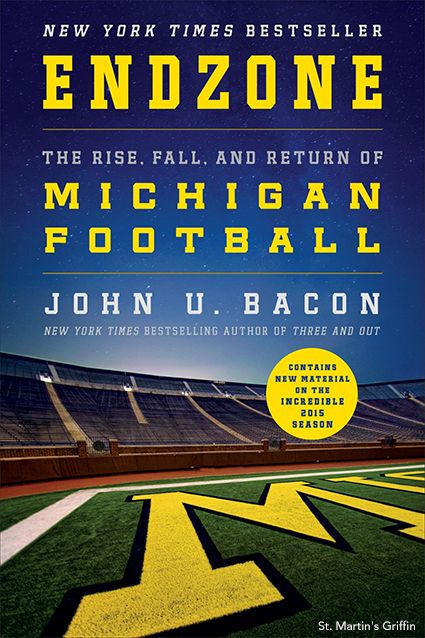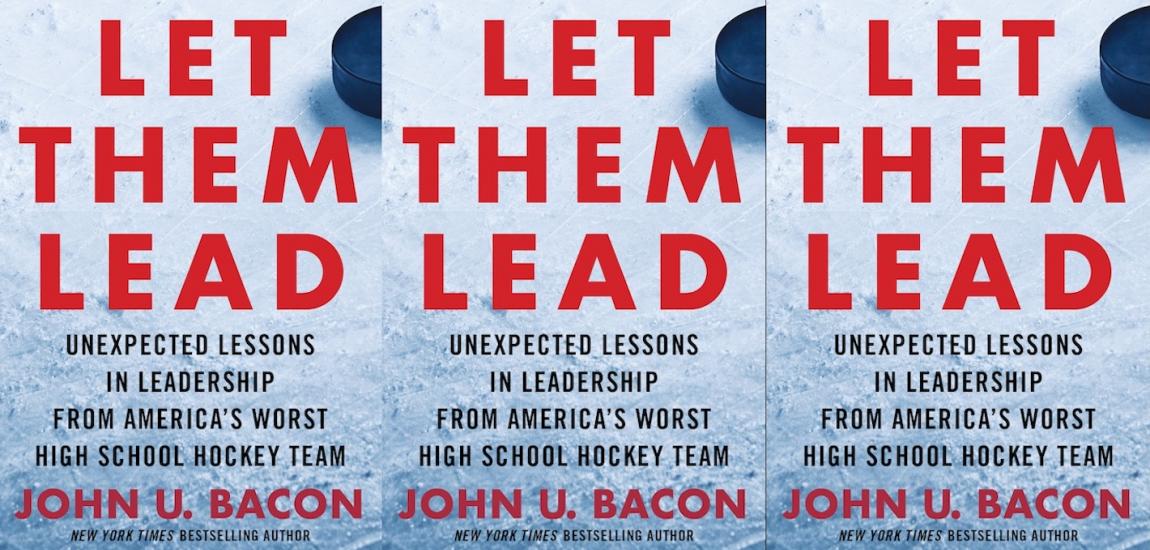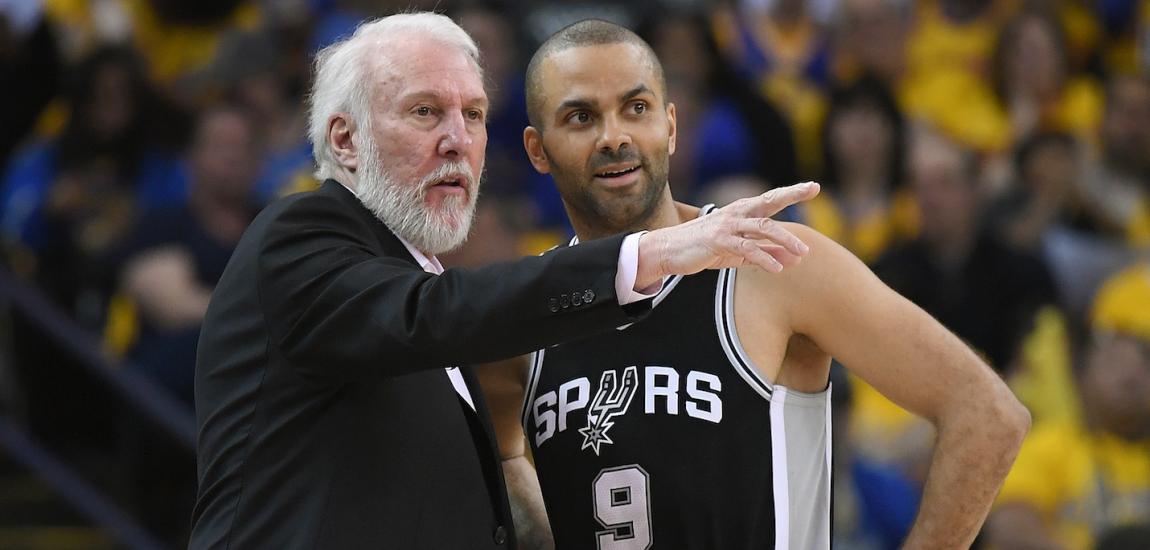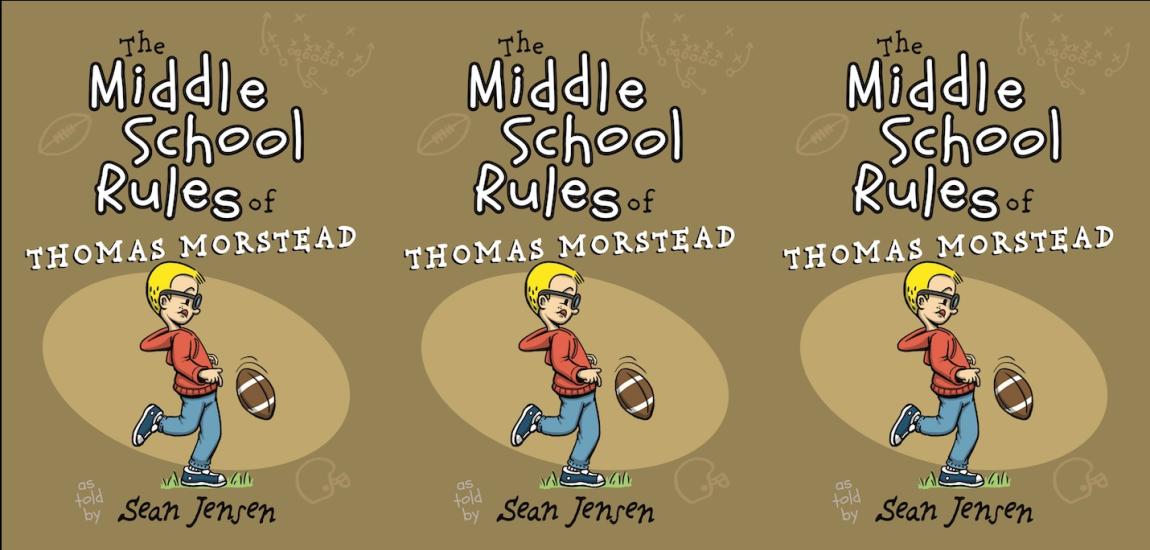New York Times bestselling author John U. Bacon tackled the story about how one of the nation's greatest programs collapsed into almost unrecognizable mediocrity during the past decade in "EndZone: The Rise, Fall, and Return of Michigan Football." Originally released September 1, 2015, the book has been updated for its paperback edition with 57 additional pages covering Michigan's triumphant 2015 season and never-dull 2016 off-season. Informed by exclusive and in-depth interviews, the new section also goes a long way to answering the question on everyone's mind: How long will Jim Harbaugh stay in Ann Arbor? Here is an excerpt:
If anyone doubted Jim Harbaugh would lead Michigan back to the promised land, on and off the field, they weren't talking.
That brings us back to the second question: How many years will Harbaugh remain in Ann Arbor? On the book tour, that question was by far the most popular. Fans asked out of both fear and hope: fear that Harbaugh would leave after a few years, and hope that he would finish his career in Ann Arbor.
The fear is real enough. Harbaugh gave his previous three teams a solid four years, but no more, leaving for a bigger position each time. Further, the more emphatically Harbaugh answers the first question -- "Can he succeed at Michigan?" -- the more likely NFL teams will try to lure him back.
Michigan fans will likely have to get used to the idea that, every time Michigan wins on Saturday, and any NFL team loses Sunday, the Monday sports talk shows will start rumors that Harbaugh will be going to one of those NFL teams. Just a few games into Harbaugh's first season at Michigan, established reporters in Indianapolis were already doing just that. But if Harbaugh didn't return to Michigan for the money in the first place, why would he leave for it? Beyond the temptation to see if he could win a Super Bowl, like his brother, the next likely reason to leave Michigan would be an unnecessarily difficult work environment. NFL coaches face ungodly pressure to win games that usually pivot on just a few plays, but they don't deal with recruiting, academic eligibility, NCAA compliance, or the many competing demands that college coaches must balance on their campus, including faculty, lettermen, alumni, donors, and the like.
None of that seemed to bother Harbaugh in his first year at Michigan, and some of it he actually liked. As one of Harbaugh's closest associates, attorney John Denniston, told me, "Jim doesn't like to recruit. He loves to recruit." If that sounds like hyperbole, you might consider the 22-state, 38-stop satellite tour, which Harbaugh described as "more fun than you can possibly imagine, like a pig in slop."
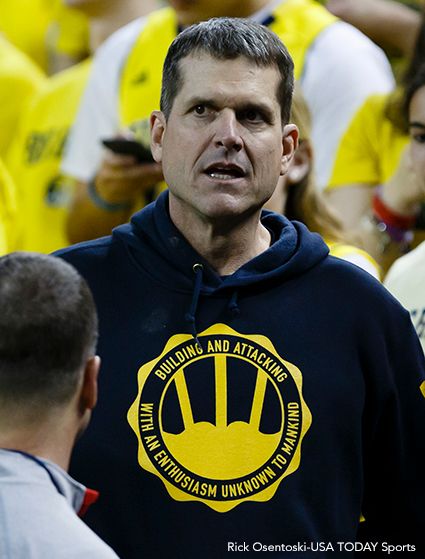
The only issue on that list that would seem to present a compelling reason for Harbaugh to leave is the health of Michigan's athletic department. When people on the book tour asked me to predict how long Harbaugh would coach Michigan, my answer was simple: It depends on his relationship with the next athletic director.
On January 29, 2016, when President Schlissel introduced Warde Manuel as Michigan's next AD, he was giving Michigan probably the best chance to retain Harbaugh long into the future. Unlike the bizarre process that ignored the search committee's input to select Dave Brandon in 2010, or the more common emergency calls that resulted in Michigan presidents naming Bill Martin, Jim Hackett, and others to the post, the process in 2016 was unhurried, thorough, professional, and rational, from the selection of the highly regarded Turnkey Search firm, the sincere inclusion of a search committee, the complete lack of leaks, and the vetting of an impressive raft of candidates, including Boston College's Brad Bates, Colorado State's Joe Parker, and Connecticut's Warde Manuel, all experienced athletic directors with strong Michigan ties.
The selection of Manuel marked the first time Michigan had selected an AD who had worked in an athletic department before since U-M named Bo Schembechler to the post, in 1988 -- with six ADs in between. It also marked the first time Michigan had hired a sitting athletic director ... ever. As with the hiring of Harbaugh, when hiring the next athletic director, Michigan's leaders decided they no longer had the luxury to experiment. They had to get a proven success. Manuel had it all: a former teammate of Harbaugh's who is steeped in Michigan tradition (with three degrees, including an MBA), with tenures at two Division I schools, and the backbone to provide private counsel to his coaches and staffers when needed.

He also brought Harbaugh's passion for his alma mater. At Manuel's introductory press conference, he recounted the first phone call he had received from Michigan about the position, asking if he might be interested. He answered, "Oh, hell yes!" The negotiations sounded very similar to those Michigan conducted with both Hackett and Harbaugh, appealing to heart over mind.
But in the same way the celebration over Harbaugh's arrival papered over problems Hoke had left behind, Manuel's hiring obscured many issues Brandon had created, chief among them the loss of loyal, experienced employees, and the hiring of more than 200 new employees, many of them inexperienced, with no ties to Michigan, and often overpaid. The result: a department in dire need of restructuring (or, perhaps, reverse structuring), and a severely bloated budget.
That, of course, is Warde Manuel's problem now, but not Harbaugh's -- at least, not directly.
The various stakeholders did an amazingly good job removing the many obstacles that would have prevented Harbaugh’s return. But as John Ghindia himself said, the best they could do was simply give Harbaugh the chance to say yes or no. After that, it would be entirely up to him.
Once Jim Hackett finally popped Harbaugh the question, on Saturday night, December 27, Harbaugh decided to take his father's advice: "Follow your heart.” More than a year later, I wanted to find out if he felt he'd made the right decision.
When I asked Harbaugh in the spring of 2016 what struck him about returning to his hometown, he'd clearly given it some thought, and had a few answers ready, from a few angles.
"What surprised me at first was how healthy people were, and young looking," he said. "Guys I went to grade school with and played with, they looked good. And the people in general seem more grounded, more rational, more centered. They're not in a hurry to be somewhere else. They like it where they are. It’s a healthy, productive, happy place, more so than other places we lived."
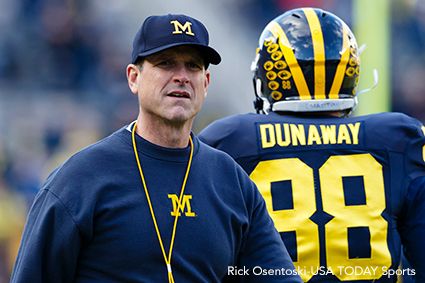
Harbaugh's assessment was certainly flattering for Ann Arborites. While Ann Arbor consistently appears on the top ten places to live for everyone from students to small business owners to senior citizens, it's a safe bet many of them would swap all those rankings for Harbaugh's praise, and for a simple reason: his appraisal indicates he has not just returned to his home town, but found his home – perhaps his final one.
"What I've noticed is that people in Ann Arbor are very community oriented," Sarah added. "People here care about the town. They're connected to it. It's a very good place to raise a family," which is a very good thing for Michigan fans to hear from a woman who happens to be raising a family.
This jogged Jim's thinking. "I've noticed that it's less negative," he added. "People are less negative about where they live, and the people they meet. There's not as much gossip, not as much talking about people behind their backs. The people just feel like they’re more trustworthy here."
Unlike Carr, Rodriguez and Hoke, who all moved to Saline, a former farmtown which has become something of an Ann Arbor suburb, the Harbaughs moved into one of Ann Arbor's oldest neighborhoods, a few doors up from Bo Schembechler's home – where Jim used to babysit Bo's son Schemy – and the same neighborhood where Fielding Yost, Fritz Crisler, and Don Canham lived.
The Harbaughs' kids go to Jim's former elementary school. His parents recently moved to the same street, when they could just as easily have relocated near John in Baltimore, or Joanie in Bloomington, Indiana, or stayed in Wisconsin. These decisions are not accidents.
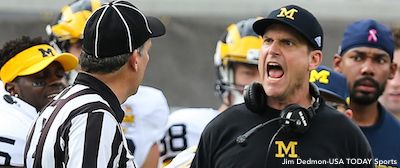
Shifting to football, Sarah said, "Stanford has good fans, the 49ers have great fans, but Michigan football is a way of life here. They've been doing it for years, and they get it from their grandfathers, and their great-grandfathers. They have these memories that stretch back generations. It's great, but to be honest, it makes me sad that I don't have that past with it.'
"Our kids will," Jim said.
Sarah turned serious for a moment, relating how some friends of hers actually hated playing college basketball, because it was such a grind. She then asked her husband, "Did you actually enjoy playing football here?"
"I didn't like playing football here," he said.
"Okay," Sarah replied, sympathetically.
"I loved playing football here!"
Just as the players Harbaugh recruits have their choice of teams, Harbaugh could coach damn near anywhere he wants. He chose to return to Michigan, though the process wasn't easy or obvious, for the most compelling reason of all: it makes him happy.
John U. Bacon is the author of four New York Times bestsellers. His latest book, Endzone: The Rise, Fall and Return of Michigan Football, is now available in paperback with an update covering the 2015 season and 2016 off-season. He gives weekly commentary on Michigan Radio, teaches at the University of Michigan and Northwestern's Medill School of Journalism, and speaks nationwide on leadership and diversity. Learn more at JohnUBacon.com, and follow him on Twitter @johnubacon.


